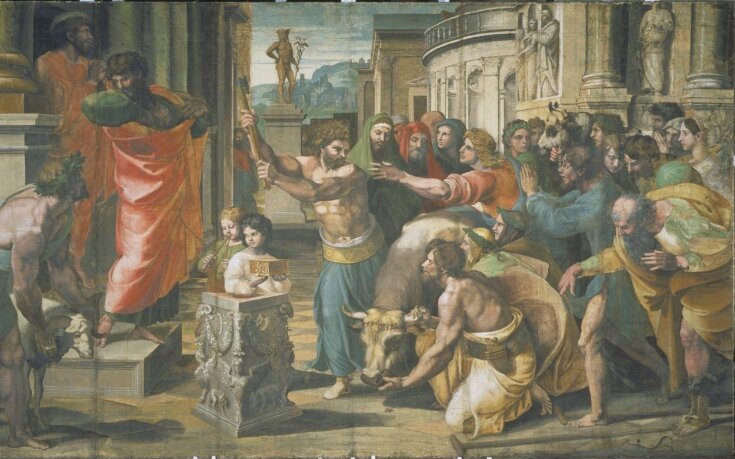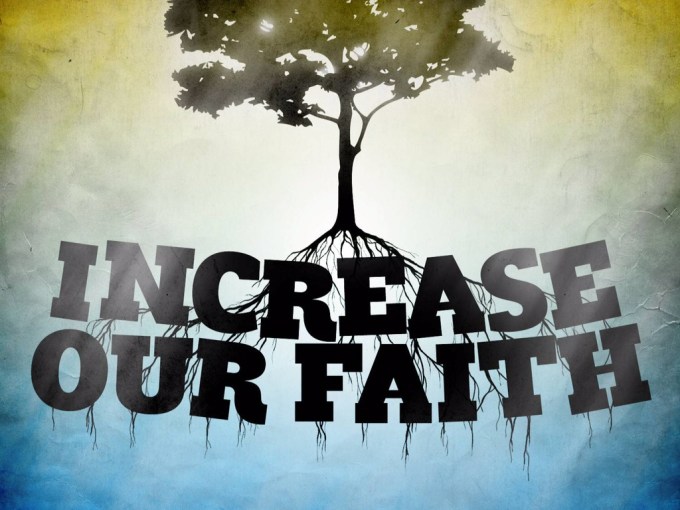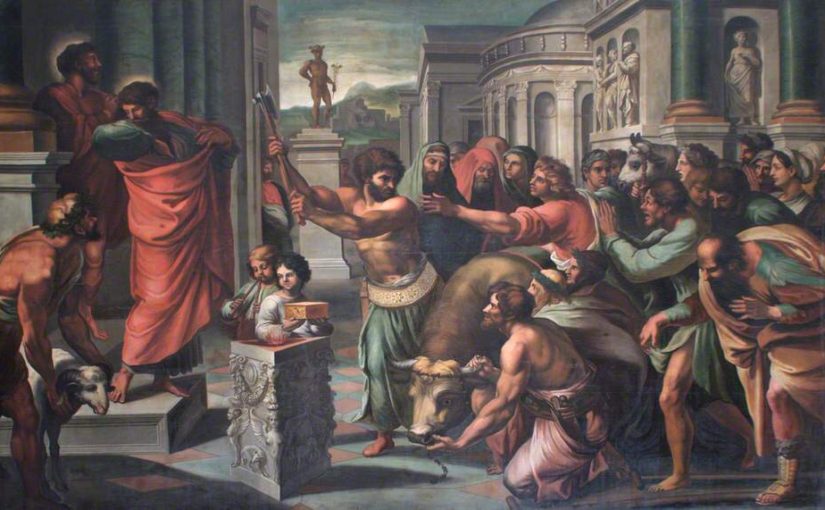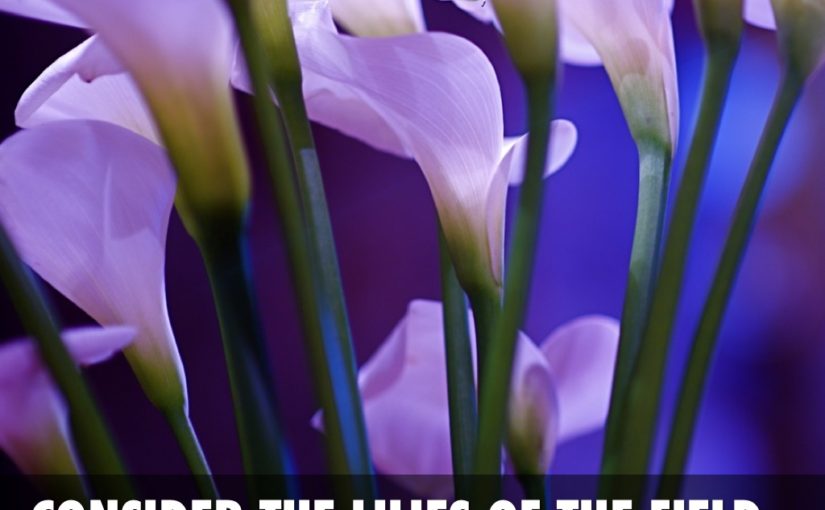Today’s readings: Acts 4:32-35 / 1 John 3:18-24 / John 15:1-8
As we gather tonight for your graduation, I can imagine that you are feeling all sorts of things. You’re probably excited, knowing what you’ve accomplished and looking forward to what lies ahead. You may be relieved, having come through good times and bad, perhaps having learned things you never thought you would grasp. Perhaps you’re a little nervous or fearful, thinking about high school and entering into the unknown after all these years. And you may be a little sad, since you’re gathered here as a class for the last time. All of those feelings are normal and part of the experience tonight. Moving forward is always exciting and scary and sad all rolled up into one. That’s life!
Your parents and teachers and all of us who have been part of your lives have a lot of mixed emotions on this occasion as well. It’s hard to see our children move to the next phase of life sometimes, but it’s also exhilarating seeing their accomplishments and celebrating the young men and women they have become. For me, it’s hard to say goodbye to all of you, because I’ve known you all for the last two and a half years; I’ve seen you grow, and so many of you have been great altar servers. You’ve stirred my heart and given me renewed faith in young people and hope for a world in the future being guided by people of faith. But however we all feel about you moving on, move on you must. That is what life is all about: growing and learning and becoming and going forward. We all want that for you, and hopefully that is what you want for yourselves.
So on this graduation day, I want to take a moment to talk to you about where you should go next. Having come through as many as ten years at our Catholic School, you have open to you a wide range of paths and opportunities. Many of them are good ones, some will be incredibly great. You will have to make some hard decisions in the days and years ahead as you carve out your niche in life and continue to become the people God created you to be. Now I’d never presume to tell you each what to do and to become and what path to follow. But I do want to leave you tonight with some principles for making these hard decisions. And nothing I will tell you is my own invention; these principles of discernment have long been part of the teaching of the Church and the living of our faith.
The first principle is to pray a lot. God has a plan for each of us in our lives. Maybe we are meant to become priests, or sisters or brothers in a religious order, or parents. Perhaps we are to become teachers or doctors or lawyers or public safety first responders. God wants us to use the gifts he has given us to glorify him. But we have to figure out exactly how to do that. And the only way we can do that is to pray. We have to ask God, every day, to reveal the part of the plan that he wants us to see. We have to trust that God will give us what we need to do what he wants us to do. We have to know God well enough to recognize the answer to our prayers and the call that he is giving us. That’s prayer. Some days, we will have a crystal clear answer, but the truth is, most days, we will have more questions than answers. But being people of constant prayer will serve us well over the long haul and teach us what we need to know to keep growing.
The second principle is to learn everything we can. Follow your passions and absorb everything that interesting people are showing you. Never stop learning about the world, and never stop learning about your faith. Whether you go to Catholic high school or public, whether you attend a Catholic university or not, you still have so much to learn about your faith. If Father Steve and I stopped growing in our faith, our parish would die. If Pope Francis stopped growing in his faith, the Church would be irrelevant. If you want to become the best you that you can be, then you have to continue to see who Christ is. You have to continue to understand what living the Gospel means. Because it is faith that truly makes sense of everything we learn about the world. If we truly want to know Truth, then we have to constantly evaluate everything we learn in terms of what we know about God and who he is and what he gives us and what he wants for us and the world. Learn everything you can and grow in your faith.
The third principle is to love before we do anything else. Whatever we think we have to do in any situation, it’s important that we first love the other people involved. To truly become the people we are meant to be, we have to love others in the same way that God has loved us. Pope Francis said recently, “To live according to the Gospel is to fight against selfishness. The Gospel is forgiveness and peace; it is love that comes from God.” The world wants us to live for ourselves, to take care of ourselves first, to live according to what we think. But that only leaves us unhappy and alone and unfulfilled. If we want to become great people, we have to love unconditionally and sacrificially, just like Jesus loved us when he took our place up there on the Cross. Because it’s only in laying down our lives for our brothers and sisters – as he did – that we can rise to new and glorious life.
And finally, the most important discernment principle is what Jesus tells us in the Gospel tonight: that we have to remain in him if we want to be truly successful. Listen to what he says again: “Whoever remains in me and I in him will bear much fruit, because without me you can do nothing.” Nothing. Nothing really good will happen apart from our life in Christ. And so it’s important that you continue to do what you’ve learned here at Notre Dame: pray every day, go to Mass every Sunday and Holy Day of Obligation and even during the week when you can, receive the Holy Eucharist and go to Confession often. Stay connected to Christ, remain in Christ, and you will truly become the person God created you to be.
Take a look at the Cross. That’s what success looks like for us believers in Christ. It looks like love beyond our wildest dreams. It looks like giving everything, trusting all the while that God will give us what we need in return. That’s how Jesus loves us, and that’s how we’re supposed to love one another too. We are probably not going to get nailed to a cross, but we are definitely called upon to give of ourselves, to lay down our lives for each other.
For all these years, we have tried to give you the tools to grow into the people you were meant to become. If you remember these things and use them and grow in them, you will be successful, happy and blessed. The goal of all our lives is to get to heaven one day, and for the time you’ve been in our Catholic school, we have done our best to give you what you need to get there, because getting to heaven is the ultimate badge of success; it’s the greatest measure of our having become who we were meant to be. I hope that you will be reasonably happy in this life, but I really want you to be eternally happy with Christ in heaven one day. I look forward to seeing the great people you will surely become as you continue to be involved here at Notre Dame in the years to come. May God bless you in every moment of your lives. And don’t ever forget where your spiritual home is: right here at Notre Dame.









You must be logged in to post a comment.